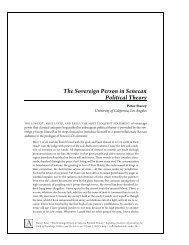Deceit, Desire, and the Literature Professor: Why Girardians Exist
Deceit, Desire, and the Literature Professor: Why Girardians Exist
Deceit, Desire, and the Literature Professor: Why Girardians Exist
Create successful ePaper yourself
Turn your PDF publications into a flip-book with our unique Google optimized e-Paper software.
LANDY | DECEIT, DESIRE, AND THE LITERATURE PROFESSOR: WHY GIRARDIANS EXIST 19<br />
tion why <strong>the</strong> messiah has to come twice, not just once—or to put it ano<strong>the</strong>r way, why <strong>the</strong> First<br />
Coming appears to have changed so little. 77<br />
A second group of followers hails from literature departments. Such followers delight, I imagine,<br />
in <strong>the</strong> combination of negativity <strong>and</strong> hyperbole—that promise to provide a single unified explanation<br />
of all phenomena while striking <strong>the</strong> proper world-weary, Gauloise-smoking, lea<strong>the</strong>rjacket-wearing<br />
pose—that has been such catnip for critics over <strong>the</strong> years. And <strong>the</strong>y probably also<br />
enjoy <strong>the</strong> ease with which <strong>the</strong> Girardian <strong>the</strong>ory can be applied to works of fiction. All you need to<br />
do is to find, or indeed invent, a “triangular” relationship among characters, <strong>the</strong>n append Girard’s<br />
magic name, <strong>and</strong> hey presto, you have yourself an article. The world of literary <strong>the</strong>ory, like <strong>the</strong><br />
world of fashion, is one of those places where mimetic mechanisms do function; with ironic appropriateness,<br />
<strong>the</strong> primary reason that people drop <strong>the</strong> name “Girard” is that o<strong>the</strong>r people do. 78<br />
The third, <strong>and</strong> most depressing, group comprises those who use <strong>the</strong> dread word “generative”<br />
when speaking about Girard’s approach. Such people do not care whe<strong>the</strong>r a given <strong>the</strong>ory is true or<br />
false; all <strong>the</strong>y care about is whe<strong>the</strong>r it spawns “interesting” readings. Now I’m prepared to concede<br />
that a reading of Hamlet according to which <strong>the</strong> main character has no desires of his own is an interesting<br />
one. But I think a reading of Hamlet according to which <strong>the</strong> main character is riddled with<br />
body <strong>the</strong>tans is an even more interesting one. (It has rockets! <strong>and</strong> aliens!) Generative brigade, what<br />
I said about Scientology was for you. If you wish to rule Scientology out of court (<strong>and</strong> I tend to<br />
think you do), it is not on <strong>the</strong> grounds of its generativity but on <strong>the</strong> grounds of its accuracy; <strong>and</strong> you<br />
should, it seems to me, start applying <strong>the</strong> same st<strong>and</strong>ards to everything else.<br />
There is, however, a fourth reason for taking an interest in Girard, <strong>and</strong> I believe it has been<br />
<strong>the</strong> single most influential. This reason can be simply stated: Girardian doctrine is a <strong>the</strong>ory of everything,<br />
on <strong>the</strong> cheap. It’s one of those systems that make you feel as though you know everything<br />
about everything while in fact requiring you to know almost nothing about anything: it’s enough<br />
to “know” <strong>the</strong> four stages mentioned above, <strong>and</strong> bingo, you have an explanation for <strong>the</strong> stock<br />
market crash, <strong>the</strong> evils of capitalism, <strong>and</strong> your neighbor’s ugly divorce. (As a bonus, you can also<br />
feel superior to those who don’t see <strong>the</strong> deep truth of such things. 79 From his surprisingly caustic<br />
77 I can’t say much about this here, but hope to on ano<strong>the</strong>r occasion. It seems fairly clear that Jesus was initially greeted<br />
by some as <strong>the</strong> Messiah, with expectations that he would fulfill during his lifetime all relevant Old Testament<br />
prophecies (an end to injustice, a reign of peace, universal mono<strong>the</strong>ism, flowers in <strong>the</strong> desert, <strong>and</strong> so on: see Isa. 2:2–<br />
4, 9:6–7, 11:6, 43:19–20, 54:5; Jer. 31:34). When he died without any of those things having taken place, it was<br />
assumed he would return almost immediately to finish <strong>the</strong> job: in all three synoptic Gospels, Jesus proclaims that<br />
“<strong>the</strong>re are some st<strong>and</strong>ing here who will not taste death before <strong>the</strong>y see that <strong>the</strong> kingdom of God has come with power”<br />
(Mark 9:1; see also Luke 9:27, Matt. 16:28). (Fascinatingly, we witnessed an identical reaction in recent times with<br />
<strong>the</strong> Lubavitcher Rebbe, Menachem Mendel Schneerson.) But of course that generation died off, too, so a new <strong>the</strong>ory<br />
was needed. The “inaugurated eschatology” position, which is perhaps <strong>the</strong> most prominent in our day, holds that <strong>the</strong><br />
Crucifixion set in motion a process that requires time to be completed. For those who adopt it, one question remains<br />
pressing: why did Jesus have to suffer? <strong>Why</strong> not just come once, in glory? The attractiveness of a <strong>the</strong>ory like Girard’s is<br />
that it seems to offer a reason: <strong>the</strong> scapegoat mechanism had to be put out of action in order for <strong>the</strong> process even to<br />
get under way in <strong>the</strong> first place.<br />
78 Perhaps this is <strong>the</strong> moment for me to confess that I too have cited Girard in various places over <strong>the</strong> years. To be<br />
sure, I have done so sparingly, <strong>and</strong> sometimes critically, but none<strong>the</strong>less I now think I should have done so less. I was,<br />
I now see, making a telling mistake about <strong>the</strong> nature of his project. It was not until I began work on this talk that I<br />
really came to underst<strong>and</strong> it.<br />
79 It may also be that some <strong>Girardians</strong> believe o<strong>the</strong>r people are susceptible to mimetic desire, but not <strong>the</strong>mselves. The<br />
feeling that “this holds true of everyone—except us” (DDN, 38) is in fact something Girard warns against in <strong>Deceit</strong>,<br />
<strong>Desire</strong>, <strong>and</strong> <strong>the</strong> Novel. “Romantic pride willingly denounces <strong>the</strong> presence of <strong>the</strong> mediator in O<strong>the</strong>rs,” continues Girard<br />
(DDN, 38), but not its presence in our own lives.



